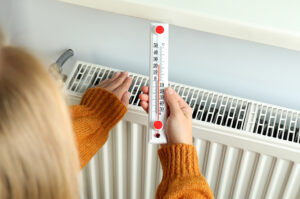Debunking 7 Heating Myths Every Homeowner Should Know

Homeowners in Cherry Hill, NJ, rely on their heating systems to stay warm through the winter months. However, some heating myths make it harder to remain comfortable by providing property owners with false information.
Get the truth about your heating system today with our team at Davis Home Services. Review common heating misconceptions and get additional facts by calling us at 844-226-9872.
#1: Bigger Is Always Better
It’s easy to see why some homeowners believe that a bigger furnace would always do a better job heating their houses. However, with heating systems, the truth is you don’t want too small or too big. Instead, it’s best to aim for just right.
Small heating systems represent a problem because they run for a long time to heat a large space, often driving up your energy bills. A big furnace, however, may run only in short bursts, resulting in uneven heating.
A heating professional can assess the size of your property to help you find the right system to heat your home. Generally, experts look at the square footage of your home, the amount of shade you get through the day, and the amount of traffic throughout your house.
#2: Closing Vents in Unused Rooms Lowers Energy Expenses
Many property owners believe that shutting the air vents in rooms they don’t use boosts the efficiency of their heating system. Unfortunately, it usually does not work out that way. Manufacturers design your heating system to heat your property based on a specific layout.
The system continues to try to heat the entirety of your home, even with some vents closed. Closing the vents causes the system to run longer and raises your energy expenses. Therefore, we recommend leaving your vents open, even in rooms you rarely use in the winter months.
#3: You Save Money by Using Space Heaters
We often hear heating myths related to space heaters. Some homeowners believe that using these small heaters will save you money. However, manufacturers design space heaters to warm small places. While they often work well if you want to snag some extra heat, they don’t function well as your primary heat source.
Running space heaters full-time to warm your home often results in much higher energy costs than sticking with gas heating. You also run a risk of a fire if you place a space heater too close to flammable material, like drapes, curtains, carpet, or furniture.
#4: Your Furnace Heats Faster if You Raise the Temperature
Some property owners feel a sense of control if they bump their thermostat up a few extra degrees when they get cold. We often hear the claim that increasing the temperature in this way makes a gas furnace work faster.
While we understand that this thought is tempting, the heater warms your home at the same rate, no matter how you set the temperature. Raising the temperature several degrees only causes the furnace to run longer as it tries to reach the new temperature you selected.
#5: Your Air Filter Doesn’t Really Matter
Most heating systems utilize an air filter that removes contaminants from the air in your home. Air filters catch debris like:
● Pollen
● Dirt
● Dust
● Pet dander or hair
Changing the filter on schedule helps improve the indoor air quality (IAQ) of your home. Taking this step limits allergies and asthma attacks. Changing the filter also makes it onto our list of helpful tips to extend the life of your HVAC system.
A clogged filter makes it harder for your heating system to function correctly. The unit ends up running more in an effort to propel air through the dirty filter. Eventually, this raises the cost of your energy expenses and may cause additional problems with your heating unit.
We recommend changing the filter per the suggestions set by the heating system manufacturer. Use filters that fit your system for the best results.
#6: Ceiling Fans Only Cool Your Home
Homeowners in the Cherry Hill area often turn on ceiling fans to bring down the temperature in the summer months. Well-known heating myths state that these fans can only cool your air and that running them in the winter works against your heating system.
In fact, ceiling fans can assist with keeping your home warm. This assistance saves you money by making your home feel warmer.
However, simply turning the fan on does not result in an immediate heating benefit. First, reverse the direction of the fan. Most fans have a switch on the bottom that allows you to toggle their orientation.
Once you flip the toggle, turn on your fan. The blades should spin in a clockwise direction, drawing warm air down from your ceiling and pushing it lower into the room. After winter passes, hit the toggle once more to reverse the course of the fan.
#7: Air Leaks Don’t Affect the Temperature of Your Home
Almost all homes today come with extensive insulation in the walls. The insulation works to keep hot air out in the summer and cold air out in the winter. However, even with this insulation, you may still have several air leaks.
We most often find air leaks around doors and windows. These small leaks allow cold air in; you may even feel noticeably colder when you walk by an area close to a leak. Your heating system must work harder to keep your house warm when you have leaks.
You may address leaks with plastic sheeting and other techniques. Homeowners also take proactive steps to stay warm by contacting heating and cooling specialists to get professional assistance blocking leaks.
Clear Up Heating Myths with Our Team
Do you have more questions about heating myths? Get professional answers to your questions from a team member at Davis Home Services. Our team also handles heating repair in Cherry Hill, NJ, and the surrounding areas. Allow us to help you stay toasty all winter by calling 844-226-9872 if you have any issues with your heating system.

